Issue Number 22, Fall 2013
Contents
- Lie Still by Carol Alexander
- Cave of the Great Galleries by Lori Lamothe
- Dwarf Elephant by Hilary Sideris
- Fallout by Patti Capel Swartz
- Faster then faster by Simon Perchik
- First Comers by Polly Brody
- Fixing Antarctica by Katharine Coles
- House Frame In November by Clara Quinlan
- How They All Swoop In by Monique Gagnon German
- Letters from the Hinterland #6, Antiquity – Destiny by Raymond Greiner
- Living for Others by Randall Potts
- Pool of Geese by Claire Blotter
- Salt by Michael Hettich
- Saugus on the Tidal Run by Tom Sheehan
- Season's Passing by Judie Rae
- The Extinction Stories: The Ivory-Bill Woodpecker by Daniel Hudon
- The Natural Order by Ken Poyner
- Twenty-Two Caliber by Brenton Fisher
- Weighing the Broken Heart by Marc Vincenz
- White Doe by Margot Farrington
Archives: by Issue | by Author Name
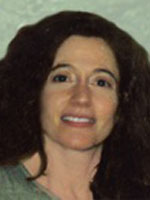
Lie Still
by Carol Alexander
Carol lives in the urban reaches of the Croton Watershed.

Lie still: those old consanguine wrongs
soon are washed away, cell reprising cell
and silty souls each cleansed by sleep.
Black stars mutter over sleepers, cold
like effigies in pitted limestone, worn
by arid winds and leaching rains.
By the shore lie our red remains,
small boats trailing skeins of blood
and nets of creatures finned and cold.
Up and down the worn beach
the gulls go railing where skates lie,
still dying with the patience of their kind.
While there is still a body beating on,
beat on, imprisoned yet uncontained
like warm inlets flooding the cold sea.
© Carol Alexander
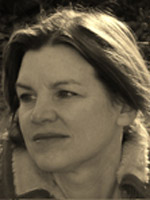
Cave of the Great Galleries
by Lori Lamothe
Lori lives with her daughter and Siberian husky in a cottage on two acres of land in the Nashua River Watershed. She remembers her grandmother telling her stories about the Nashua changing color when the factories along the river dumped dyes into the water. At one point the river was so polluted its chief life form was sewage worms. Thanks to the efforts of environmental groups it now "runs clean."

You would never guess
not from the surface.
Big block letters laid out
in stereo, white glaring on green
as if the farmer who found
rock blowing wind
is still shouting his name.
When you arrive in Cretaceous
sixteen stories down
what surprises you most is not
the way the music of water
seems so much slower than
the dripping of your own faucet,
not the schools of blind fish
threading paths through fear.
What surprises you most
is how the walls keep opening
into rooms never imagined
what was hidden multiplying
like mirrors blooming.
Previously published in Seattle Review
© Lori Lamothe
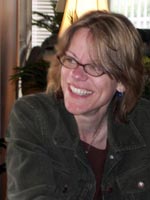
Dwarf Elephant
by Hilary Sideris
Hilary lives in Brooklyn, near Prospect Park, which lies on a ridge of terminal moraine that used to be under a sheet of ice one thousand feet thick.

To Sicily before Sicilians,
he ambulated at low tide, or
likelier—his kind being born
to snorkel—swam, ten tons
of him, to thrive by shrinkage,
finally to fifty pounds, as per
the island rule: fauna diminish
on an unattached landmass.
Boar-sized, he grazed
on beach grass, played
in sea foam, & could feed
a human tribe for days.
© Hilary Sideris
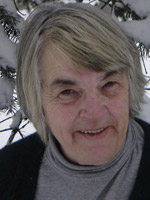
Fallout
by Patti Capel Swartz
Patti grew up and currently lives in the watershed of the Middle Fork of Little Beaver Creek Wild and Scenic River, a part of the watershed of the Ohio River. Her office overlooks the Ohio between Southern Ohio and the Northern Panhandle of West Virginia.

I hold one share in the corporate earth and am uneasy about the management...
The correct amount of strontium with which to impregnate the topsoil is no strontium.
E. B. White, 1956
We sat at the dinner table, seven of us, eating beef from our cows, mashed potatoes, corn from the garden. “I don’t know what this new nonsense will mean,” Father said. “Radioactivity in the milk. Strontium 90, whatever that is. The government is going to tell us again what we have to do. Whether our milk is fit for sale. If they decide it’s not, what will we do?”
I listened, an eight-year-old anxious to know what the grown-up talk meant. “What IS that stuff?” my brother asked. “They say it's fallout from those nuclear tests. That the wind blows it across the country, and the rain washes it onto the ground. The cows eat the grass. The milk gets radioactive. They’re saying the milk isn’t safe.” I looked at the half glass of my milk, raw milk, cooled and dipped straight from the cooler. From the corner of my eye, I saw the others look too.
When the ban on DDT came down, Father was disgusted. “Don’t know what we’ll use to keep down the flies,” he said. I remember the sprayer, my job to spray the cows in summer when they were in the barn being milked. I was so short, I had to tip the pump sprayer back. I remember the dirty, sticky lines the spray made as it ran down my arms to my elbows. I remember wiping my face with a sticky hand, waiting for my bath to feel clean.
When the sand ran out, my brother and I played in agricultural slag, by-product of the mills, full of manganese and other metals. We built roads, caves, landing strips for airplanes.
When my brother was undergoing chemotherapy, I realized how like my German grandfather he looked.
The same nose, high cheekbones, shiny forehead. Only his feet were like my father’s, high-arched, curled tight. Within a year he was dead.
When my sister had her bone marrow destroyed to treat her leukemia, I realized how much she looked like my father’s mother, the same English features, blue eyes.
And Jay. Who could forget the sister who died when only twenty four? The image of Mother, but skeleton thin, curled tight in pain, the tumors rising higher than any of her other parts.
Three of five dead to cancer. Formidable odds.
© Patti Capel Swartz
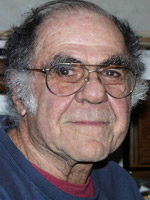
Faster then faster
by Simon Perchik
Simon lives in East Hampton, New York, in the South Shore Estuary Reserve Watershed.

Faster then faster this gate
gaining the advantage, crouches
the way skaters surround their arms
and around these dead
clinging to stone and mornings
-by instinct the fence
slides your hand closer
touches your sleeves
as marble and rapture
--even without this breeze
you're used to the sky
pulling you in, smaller and smaller
as if the Earth stopped before
let its dirt fall away, open
not yet from behind.
© Simon Perchik
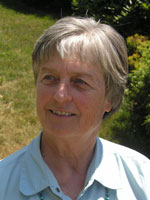
First Comers
by Polly Brody
Polly lives in an exurban Connecticut town, about 500 ft. above sea level, about an hour's drive inland from Long Island Sound. Every year she listens from her window for the first chiming peep of spring hylas that give voice to a pond, just within hearing.

Man entered the western hemisphere, carrying Stone Age weapons and fire. The glacial age tundra teemed with megafauna whose 20 million year evolution had been apart from that of Homo. In a few millennia this fauna was extinct.
You mammoths: shagged hulks who
barely stepped aside at first,
panic now before their clever fire
driving you toward ravines
and fatal plunges.
You steppe ponies: fat rumps inviting butchery,
stampede screaming confusion
within the circle of their ambush.
Your kind will not again set hoof here
until your second coming, bearing Spaniards.
You ground sloth: slow herbivore
large as the mighty bear, but un-fanged,
how you swing your stunned head
above this rabble, as honed stone
drives into your liver.
And you great-antlered caribou:
migrant dependable as the sun,
jammed tight with your calves
into rivers, how your tangled racks clatter
while you buck in bloody froth.
Lion incisors dangle from the shaman’s medicine bag.
Bear pelts keep naked bodies warm.
Megabeasts dwindle, the People flourish.
In the voids they create,
they invent gods of fur and horn,
shapes remembered in mind’s dark negative.
© Polly Brody
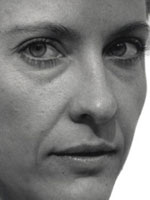
Fixing Antarctica
by Katharine Coles
Katharine lives atop a foothill abutting City Creek Canyon, one of Salt Lake City's six protected watershed canyons. She and her husband share space (and their garden) with mule deer, coyotes, raccoons, squirrels, various hawks and other birds, weasels, wild turkeys, foxes, and the occasional moose or bobcat.

I keep taking the same photo over and over
As if to say Look, and Look. The light
Shifts minute by minute and everything
Holds: cormorant’s flight, clouds
In motion, the glacier losing itself
Perpetually to sea, sea to sky—
And so we have returned, to consider what
Cannot be recovered. What is permanent
Is this moment, then this one, and always
Slipstreaming between them, the change.
© Katharine Coles
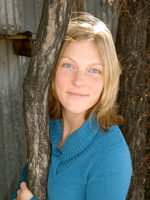
House Frame In November
by Clara Quinlan
Clara lives in the Front Range of the Rocky Mountains, where Longs Peak looms in the near distance and Coal Creek cuts dramatically across the land.

Snow passes through
the living room like sand spilling
from an unfolded hand.
The upstairs closet tucking its white
linens deep in each corner.
From the crest of the hills, trees dyed
with the last of autumn pour down,
host of barked wood shivering
behind these smooth beams,
a canvas for each room: browns,
grays surfacing to orange, the rafters
unable to quell the fire of
leaves taunting the gauzy dome
above. If we found the room
where first prints might appear, palm
the gathering snow (here, a stolen
beginning, the fundamental hour)
our flesh’s heat taken in by the floor,
could we then be blameless?
Space left above our chapped hands
an echo of what we once were,
we could rise from this much.
© Clara Quinlan

How They All Swoop In
by Monique Gagnon German
Monique lives along the Susquehanna River Basin in south-central Pennsylvania, writing poems above the Codorus Creek watershed.

Not vultures quite
flock of ruffled pelicans
picking over what’s left,
tossing whole fish,
tadpoles, crustaceans,
turtles, eggs, into their gullets.
Fights break out, beaks flash,
pecking over everything,
who gets what first,
who is quickest now
that the elders are gone,
no longer loving pod,
caring brood,
now just squawking
squadron angry grief
wrestling, fouling
everything, leaving void,
robbing neighbors’ nests,
forgetting what’s
most important,
who’s here with them,
what’s really left,
their family,
their species.
© Monique Gagnon German
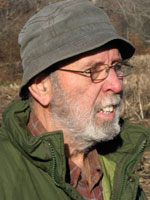
Letters from the Hinterland #6, Antiquity – Destiny
by Raymond Greiner
Raymond lives with his canine companions Orion and Venus on 14 acres of remote forested and pasture land about three miles from the hamlet of Paragon, Indiana, in a cabin about 500 yards from the little-traveled road.

A few months ago I was researching for an essay on the cycles of the sun, learning about the billions of years it has taken to achieve its present state, and how it will continue to expand, eventually achieving its red giant phase and then diminishing in size, becoming a white dwarf star. I mentioned this study and how Earth will perish during the red giant phase as the sun encompasses the Earth’s orbital zone to a correspondent. His response: “Why is this important? None of us will be alive.”
Of course his observation is partly correct; we will not be here. But both the distant past and future have great impact on present day organisms. How so? If it were not for evolutionary cycles, we would not be here. So what happened early on created Now, created us. At this historical point we represent the present, and as a species we project an influential force driving forward toward the near (and possibly the distant) future. The cycles of the distant past and distant future plant a notional seed of what has happened and what can be predicted to happen, therefore profoundly influencing Earth’s beings during the human cycle period. Our present-day lives are enhanced by our awareness of Earth’s movements, and the magnitude of its past and future as we transit this current time. Knowledge of Earth’s timeline adds dimensional thoughts, creating spiritual consciousness, real-time cognition of life on our planet and its importance.
The dogs and I have a few favorite trails in the nearby state forest, and one-of them transits the bank of Burkhart Creek, a meandering creek with a particular turn that offers a nice resting point. The forest workers have placed a picnic table there, but it is seldom used because this is a hike-in spot and the typical picnic folks are drive-up oriented. So this spot has become sort of our personal place. There is sedimentary build-up on the inside portion of the creek’s turn, where we have discovered several geodes.
What about geodes? They occur in abundance in only five states: Indiana, Iowa, Missouri, Kentucky and Utah. These are baseball-sized, some a bit larger, round stones with hollow interiors composed largely of quartz. Rock hounds collect them and saw them in half, exposing the glitter of the internal quartz, and then polish the edges for use as paperweights or ornaments. Geodes are products of geological activity during the Mississippian Age, and are approximately 340 million years old. As I hold one of these discoveries in my hand, the sensation of its long history magnifies the emotion of the moment. This geode was intact, as it is now, when the first humans appeared two-three million years ago, and it was 337-338 million years old at that time. It challenges the imagination to fathom such a span of time.
Living organisms offer us even personal and direct awareness of the magnitude of Time, and with less strain on the imagination. The giant Sequoia, the General Sherman tree, is between 2300 and 2700 years old. Many of these beautiful and ancient trees were slaughtered by humans during the 19th and early 20th centuries and were threatened with extinction. The Sequoias are not the oldest trees, but they are likely the most spectacular of the older species. There is one spectacularly beautiful tree, the Zoroastrian Sarv, that is 4500 years old, and the oldest living tree is the Methuselah. At 4700 years old, located in Inyo National Forest in California, it was 1000 years old when the first pyramid was built.
Why is all of this meaningful? I believe that knowledge of life and its cycles in relationship to time allows perspective, opening truths and knowledge that can be applied to our journey as a species. We have stumbled in so many ways as we make our walk with time, gaining balance and stability as a species should, and probably will, as our timeline gains momentum and understanding. We must come to see the power of our own destructive force, the ways in which that force can cause the Earth and its creatures to languish and stagnate. If we are to be a presence similar to the geode, we must adjust to the challenge of longevity, blend antiquity with destiny. It seems possible.
© Raymond Greiner
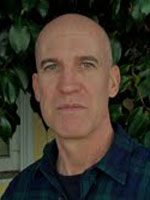
Living for Others
by Randall Potts
Randall lives in the Northbrae district of Berkeley, California, which was occupied by the Huichin band of the Ohlone for tens of thousands of years. Their acorn-grinding pits still remain in the rhyolite rock formations at Indian Rock Park, about a block from his home.

As I came to life
The human swarm devoured—
Just a drone, I dissolved
Into the pulse of the hive.
I’m doing what I can
White days, alone—
To keep the barn cat eating
And the bent house leaning—
Trying not to think ahead
While the inconvenient plants are dying.
© Randall Potts
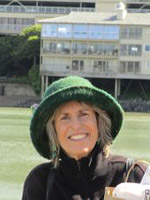
Pool of Geese
by Claire Blotter
Claire lives on the edge of Richardson Bay Watershed near Marin Headlands and the Golden Gate Bridge in a neighborhood known as Hurricane Gulch.

Sometimes through those trembling
wings the whole flock slips slightly to its side
in pure avian joy a oneness where each
opaque cell knows its place in the wild
bird body....
Excerpt previously published in the author’s book MOMENT IN THE MOMENT HOUSE (Finishing Line Press, 2013)
© Claire Blotter
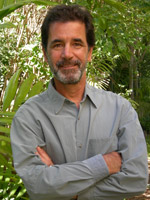
Salt
by Michael Hettich
Michael lives on the Atlantic Coastal Ridge in the Biscayne Bay Watershed of South Florida, a mile west of Biscayne Bay.

If a man takes a walk in the rain, barefoot
because he’s had a dream of fallen leaves and healing,
and if the rain tastes like salt and stings his eyes
like salt. If the man understands what salty rain will do.
The rain is falling hard now; if the man asks the wind
to blow the salty rain out into the ocean
and tastes the rain turn fresh again. This man is full of holes
where others are covered in skin.
The rain falls salty for a moment then turns fresh again.
The bay turns into a freshwater lake
for a single tide. My fingernails are burning
he tells his daughter as he brushes her long hair,
he tells his son by breathing, he tells
his wife when he touches her. But then she’s burning too,
burning with salt. The light is salty now, falling
salty even in the wilderness.
The wind is blowing salty too. The salty snow will fall, white
as always; salty rivers will flow
like our blood flows through our bodies, salty
rain falls everywhere, everywhere, into
the wounds we didn’t even know we’d suffered; it stings
until we can’t sleep. And not because it’s healing.
© Michael Hettich
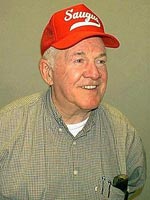
Saugus on the Tidal Run
by Tom Sheehan
Tom lives in a house built in 1742 about 200 feet from the Saugus River in the Saugus River Watershed bounding 900 acres of the Rumney Salt Marsh and 450 acres of a wetland, Reedy Meadows.

What of all the spills that ache here --- upland dosage where the delta’s done and settling its own routines, the near immeasurable transfer of land and other properties of the continent chasing down Atlantic ways, shifting nations and cities from directly underfoot, moving towns along the watershed, oozing territories.
Oh, how I loved the river feeding the ocean.
I have plumbed the Saugus at the river mouth, found the small artifacts of its leaning seaward, tiny bits of history and geography getting muddied up against the Atlantic drift, suffering at tide’s stroke, roiling and eddying to claim selves, marveling at a century’s line of movement, its casual change of character, its causal stress and slight fracturing under ocean’s dual drives, the endless pulsing tide and the overhead draft of clouds bringing their inland torment and trial, land and loam and leaf running away with the swift sprinters of water, the headlong rush of heading home like salmon bursting upstream for the one place they can remember in the chemistry of life, impulses stronger than electricity, smells calling in the water more exotic than Chinese perfume.
The flounder, sheaving under the bridge at the marsh road, pages of an un-sprung book, one-eyed it always seems, hungering for my helpless and hooked worms, sort over parts of Saugus in this great give-away, and nose into the extraneous parts that were my town, my town.
“Listen,” my father said to me, his eyes dark, oh black during a whole generation, “for a sound whose syllable you can’t count up or down, for what you might think is a clam being shucked, a quahog’s last quiet piss on sand, a kelp bubble exploding its one green-stressed overture.”
He talked like that when he knew I was listening, even at ten years of age.
He wasn’t saying, “Listen for me,” just, “Listen for the voices, the statements along Atlantic ritual, every driven shore, rocks sea-swabbed, iodine fists of air potent as heavyweight’s, tides tossing off their turnpike hum, black-edged brackish ponds holding on for dear life, holding a new sun sultry as anchovies … all of them have words for you.”
I hear that oath of his, the Earth-connected vow all the sea bears, the echoes booming like whale sounds, their deep musical communication, now saying one of his memorials, “Sixty-years and more, I feel you touch Normandy’s sand, measuring the grains of your hope, each grain a stone; and I know the visions last carved in June’s damp air.”
“Oh,” he’d add, “you sons, forgotten masters of our fate.”
Deepest of all, hearing what I didn’t hear at ten, but hear ever since, the hull-hammered rattling before rescue from the USS Squalus, 60 fathoms down off Portsmouth, the sound and the petition count never fading; three quarters of a century of desperation and plea hammering in my ears.
Say it straight out: “Some were saved and some were lost. That is a memorial.”
The eels squirm and fidget on Saugus farmlands, pitch-black bottom land gone south with rain and years, gutter leanings, great steel street drains emptying lawns and backyards and sidewalk driftage into the river below black clouds. The worn asphalt shingles on my roof yield twenty-five years of granules, and now and then tell that story inside the house.
A ninety-year old pear tree shudders under lightning and offers pieces of itself as sacrifice to the cause, dropping twigs, blasted bark other lightning has tossed into the soft footing, the grayed-out hair of old nests, my initials and hers and the scored heart time has scabbed up, dated, pruned, becoming illegible in the high fancy of new leaves and young shoots. There, too, went my father’s footprints in one April storm, washed away in late afternoon as he lay sleeping in that tree’s hammock; and grease off my brother’s hands from his Ford with nine lives hanging on a chain-fall; and across the street a neighbor’s ashes spread under grapevines and pear tree an August fire later took captive in dark smoke I still smell on heavy summer evenings.
This is my word on all of this, this act of love, this adoration:
It is where the river’s done and has the yearling host, this boy’s lonely boast he’s lived the night at water’s edge, on safety’s ledge, on Atlantic side leaning inward from mighty crest and wave where fishermen become brave. I know panoramic view, gulls’ endowment, how fish shapes call them from Earth’s face, that spinning race about the sun and those who dare the seaward fare and spell of salted lung when a boy’s hung between the sunlit surface and a pinch of salt, who knows twisted souls at sea, sweet misery of warming sand, a hand not forgotten far from land where flotation guise reflects on lower skies. I know how water marks horizon’s dwelling where dark stream and ocean meet twice in flow of bayside surge and ocean merge loses out in river’s downhill push, losing lush things like gravel I have trod, and the locks and board holding back my river horde.
Oh, believe … I have come up by image from the sea in other times, by overhand, by curragh, by slung-sailed ship of oak, afloat a near-sunken log; have crawled sandy edges of the bay, looked back at waters’ merge and flow, found the river’s crawl reversed where floating parts are nursed, toting redwing nests the winds abuse, good ground the rain in swift return hauls down the river … Saugus on the loose.
© Tom Sheehan
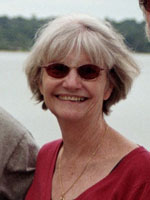
Season's Passing
by Judie Rae
Judie, a Canadian, lives in Nevada City, California, in the South Yuba Watershed, an area whose trees and waterways remind her of magical summers spent at her grandmother’s cottage on the Ottawa River.

After a fall rain
when the earth smells
of spores and small
hopes,
berries hang,
pie ripe,
untouched,
lost to summer’s bounty.
In the field
the bones of a fallen deer
too old even for dog wonder
glisten in the last sun
and gather milky
proof
of season’s passing.
Previously published in The Acorn.
© Judie Rae
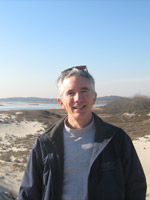
The Extinction Stories: The Ivory-Bill Woodpecker
by Daniel Hudon
Daniel lives on the East Coast, not far from various nesting sites of the endangered piping plover in the Charles watershed.

You had to go scouting deep into the swamps and river bottomland woods that once spanned the deep South if you wanted to glimpse the largest woodpecker of North America. Famous as a recluse, the splendid Ivory-bill woodpecker has been described as “nature’s exclamation point, the personification of pizzazz – a full-throated yell of a bird.” Such was its size and majesty that sightings typically inspired exclamations of “Lord God!” and this became one of its nicknames, The Lord God Bird.
Black bodied with a white racing stripe that ran down its head and neck along its back, the Ivory-bill had a gleaming yellow eye and was topped with a brilliant scarlet crest. Nearly two feet long from head to tail, it hopped up and down the sides of cypresses and hackeberries in search of a place to pound its three-inch long bill into the bark for grubs of the long-horned beetle, its favorite food. Its call was tinny but extraordinarily loud, “like someone blowing into a megaphone with the mouthpiece of a clarinet, blasting out single notes that could be heard half a mile away.”
How far did it roam for food? Did it have enemies? What were its courtship rituals? Did pairs mate for life? The high profile sightings couldn’t answer these questions.
With its numbers dwindling due to logging, the State of Louisiana finally began to manage the last remaining habitat of the Ivory-bill woodpecker in the early part of the 20th century. However, the logging rights to the land were held by the Chicago Mill and Lumber Company who refused to deal. “We are just money grubbers,” said James F. Griswold, the chairman of the board for Chicago Mill. “We are not concerned, as are you folks, with ethical considerations.”
When the land was logged in the 1940’s, the charismatic Ivory-bill woodpecker went with it.
© Daniel Hudon
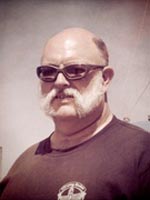
The Natural Order
by Ken Poyner
Ken and his wife live in a forest of town homes, surrounded by a marcher land of track residences, all held back only by the Naval Base and the terror of the sea. All of this drains through the Lynnhaven-Poquoson watershed - part of the superlative Chesapeake Bay watershed -- to the Chesapeake Bay and the Atlantic Ocean.

The rain intended to fall just there.
All day it has been planning to fall
Along that edge, in that puddle, across
That front lawn. The key to the rain
Is in its wanting to fall just where
It is falling, meeting its original proposal,
Completing its day’s plan. For hours
It has driven the clouds, selected
Resilient winds, checked its notes
And plotted topographies. It takes
Great skill, yet the rain is never wrong,
It has never fallen where it does not want to:
All of its missions end in success.
After each precipitation event
The rain is satisfied. You,
You in the drenched shirt and ruined
Pants, hair matted flat to your forehead,
Should see joy in the perfection,
The happy march of fulfilled rain storms,
Stretching centuries long, simple storms achieved.
What could your anger, random and
Randomness, say to such schemes of joy?
© Ken Poyner
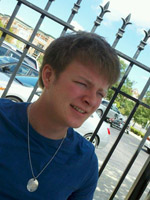
Twenty-Two Caliber
by Brenton Fisher
Brenton resides in Normal, Illinois, situated on the northern edge of the Salt watershed.

The first time I killed, it was euphoric in an ambiguous sort of way. Not in the good sense of the word but euphoric in a way similar to drowning, the last few moments of it, where you’re forced to watch the end of something.
I would never call what I did murder, despite the fact that I knew I was going to kill before I did it. Murder requires careful planning, an alibi, meticulous clean-up, acting, an aggressive reason and that sort of thing, maybe even a scapegoat if you wanted to get crafty. All I really did was put something in my scope and pull the trigger. I didn’t even have to drag the body back to the truck. My uncle did that.
Mist clung to the early morning air and the breaching sunlight teased the animals that had been forced to wait out the cold, unforgiving, night outside. I walked beside my uncle through grass and weeds with the pants from my ankle up to my knee soaked in morning dew. My uncle towered above me, a small cooler in one hand and a long black rifle slung over his shoulder. On each of our backs we carried a fold-up chair. The trees around me seemed more stationary than usual. Their statuesque nature appeared rather amplified by the frosty air that tore at their barky skin.
At his side, I kept up with my uncle’s long strides passing tree after tree, each one looking down on us with wary eyes, until finally we found a tree that trusted us more than the rest and we unfolded our chairs beneath its branches.
We sat quietly together, my uncle drinking beer after beer, turning toward the tree every so often to bathe it in urine. Time slunk by. All I could do was search the empty trees.
“Where are they all?” I finally asked.
He took a slow look around, then turned his head to me with puckered lips and shrugged.
I knew they were somewhere. Maybe they haven’t woken up yet, I thought to myself.
As I was examining one particular branch for any sign of life, a strong hand wrapped around my shoulder making me jump. I turned to see my uncle’s face fixated on a tree several to the left of the one I had been looking at. With a thick index finger he pointed to it, handing me the rifle with his other hand.
I accepted it, going over what he had taught me in my head. I aimed it away from both of us, clicked the dark safety circle off, and pulled the gun up to my shoulder.
“Do you see it?” he whispered.
I nodded, peeking over the scope to locate the drowsy tree-dwelling animal. My heart forced adrenaline into my veins and a surge of heat and sweat came over me battling with the cold air around me. I swallowed and closed my left eye.
In the cross hairs of the rifle I saw it, looking around, starting its day. I didn’t have time to think, but something inside me pleaded for me to stop. I pulled the heavy trigger anyway.
The butt of the gun slammed into my shoulder and I opened both eyes, just in time to watch the squirrel tumble down to the ground, its fall cushioned by grass and brush.
I sat up straight, trying to see what I had done.
“Did I get it?”
My uncle chuckled, “Ye-he-es, you did.”
He was proud of me, I could tell. I wasn’t sure why, but he was, so I forced a smile. I sat in silence, left alone with myself, while my uncle retrieved the animal I had blasted out of its home. He carried it by its tail, tossing it down in the grass by our chairs before sitting back down in his.
Its chest was open. Dark red innards and white splinters of bone were visible from where the skin had been peeled back by my bullet. I stared down at it, confused. It was breathing.
“What’s it doing, Uncle Mark?” I asked, staring at the mangled body as it changed the color of the grass.
He looked down at it. For a few moments their breathing synchronized. Heavy, full breathing filled the thin encompassing air in vacant puffs of steam.
“It’s dying,” he replied after the moments passed.
I blinked, and so did the squirrel. Teetering on the edge of its own life, its black beady eyes kept themselves glued to mine. It watched me, only ever breathing, blinking, and bleeding.
“Oh.”
© Brenton Fisher

Weighing the Broken Heart
by Marc Vincenz
Marc lives in the Icelandic town of Mosfellsbaer, where, south of the Arctic Circle, the rivers Leirvogsá, Kaldakvísl and Varmá empty into the North Sea.

Blessed the wind. Cantankerous, asthmatic priest
in swollen robes & feathered headgear—
once oceanblue & redgold—now charcoaled
darkening to soot. Waterfed & corn-bred, sun-
worshipping, sun-cursed, a ruinous disseminating
soul, gilded & guilt-ridden, heavy-handed &
lightly-touched—exhales in exhausted prayer
through empty lanes & alleys, prods rooftops,
rattles broken panes, half-open doors, hinges
groaning upon buckling frames, fingers
familiar faces of dying trees, thumbs anaemic
birds’ nests, rubs eggs to awaken life within,
kicks empty bottles & tins into blank squares,
crumpled things under porticos & steps, blows
ancient news into coppery osprey, kites, puffed up
eagles with giant wings, tears leatherbound
psalms from the palms of pews & aisles,
whispers names of long-forgotten gods, leftover
vowels as if in pigeon, as if in a burning
foreign tongue &, as he gathers himself
from his four corners, draws upon the strings,
he recalls what it was like to breathe
life into sun-filled stuff, how oxygen was
a litany & how every rain was an Amen,
he remembers cragged prayers, fragments
in leaves scattering within his own tree, roots
sinking to search for belief, limbs stretching out
over a flock—the tremulous keys of a Portuguese
accordion wheezing a simple song into his lungs,
the exhumation of a thousand jagged sins.
& now, on his last legs, he must remind himself
once & again, he is neither woman nor is he man,
he is nothing, nothing at all. Blessed the wind.
© Marc Vincenz
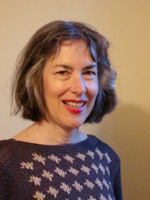
White Doe
by Margot Farrington
Margot lives in Williamsburg, Brooklyn, two blocks from the tidal sweep of the East River--a major flyway for migratory birds.

* The Celts considered white deer to be messengers from The Otherworld
This is the closest you’ll ever
come to a unicorn. (Breathe, don’t
breathe behind your
window of hemlocks).
Luminous doe in failing light,
among dark others. Listening.
About to turn,
find you out, and speak.
Don’t think; she’ll hear you. Don’t
move a perceptible inch.
Conspiracies of twigs lie
cocked to sound pistol shots.
Why does she summon up old loves
stunning as these first flakes,
settling one by clear-cut one
upon your jacket sleeves?
They whirl and run--she’s torn from
you--a page from your journal, but
which one, what day of your
life whose moments ignite
this one? Sunset forces the
clouds apart with sudden
phoenix-light; contrasted flakes
read like ash, blown from huge fires.
Previously published in San Pedro River Review.
Photo by Gary Robertson flickr.com/photos/garytrinity/
© Margot Farrington